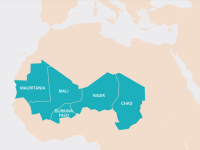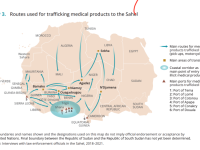News
TRAFFICKING IN MEDICAL PRODUCTS IN THE SAHEL: TRANSNATIONAL ORGANIZED CRIME
THREAT ASSESSMENT

(Source: UNODC)
ARAC International Strategic Communications -
>ReliefWeb Analysis
Format>Source:UNODC | Posted:31 Jan 2023 | Originally published:31 Jan 2023
Key takeaways
In the Sahel countries and their neighbours, the high prevalence of infectious diseases, including malaria, coupled with challenges in terms of the availability and affordability of and access to healthcare, creates an environment in which the demand for medical products and services is not fully met through formal channels.
The disparity between the demand for and supply of regulated pharmaceutical products leaves room for trafficking, provides an incentive for the involvement of organized criminal groups and fuels the ongoing threat to public safety and public health in the Sahel countries.
Between January 2017 and December 2021, at least 605 tons of different medical products were seized in West Africa during international operations.
Format>Source:UNODC | Posted:31 Jan 2023 | Originally published:31 Jan 2023
Key takeaways
In the Sahel countries and their neighbours, the high prevalence of infectious diseases, including malaria, coupled with challenges in terms of the availability and affordability of and access to healthcare, creates an environment in which the demand for medical products and services is not fully met through formal channels.
The disparity between the demand for and supply of regulated pharmaceutical products leaves room for trafficking, provides an incentive for the involvement of organized criminal groups and fuels the ongoing threat to public safety and public health in the Sahel countries.
Between January 2017 and December 2021, at least 605 tons of different medical products were seized in West Africa during international operations.
While there are no reliable estimates of the overall quantities of medical products that are trafficked in different ways and forms in the Sahel countries, studies point to a percentage point to a percentage of substandard and falsified medicines in the medical market of between 19 and 50 per cent.
While there are no reliable estimates of the overall quantities of medical products that are trafficked in different ways and forms in the Sahel countries, studies point to a percentage point to a percentage of substandard and falsified medicines in the medical market of between 19 and 50 per cent.
Medical products diverted from the legal supply chain often originate in the main exporting countries of medical products to the Sahel countries, in particular Belgium and France, and to a lesser extent China and India. Others are manufactured in neighbouring countries, including in North Africa and the Gulf of Guinea.
While there are no reliable estimates of the overall quantities of medical products that are trafficked in different ways and forms in the Sahel countries, studies point to a percentage point to a percentage of substandard and falsified medicines in the medical market of between 19 and 50 per cent.
Medical products diverted from the legal supply chain often originate in the main exporting countries of medical products to the Sahel countries, in particular Belgium and France, and to a lesser extent China and India. Others are manufactured in neighbouring countries, including in North Africa and the Gulf of Guinea.
The seaports in the Gulf of Guinea, Conakry (Guinea), Tema (Ghana), Lomé (Togo), Cotonou (Benin) and Apapa (Nigeria) can be identified as major entry points for medical products destined for the Sahel countries. Trafficking by air, using postal shipments or carried out by commercial air passengers, is employed for smuggling smaller quantities of medical products. Once in West Africa, trafficked medical products reach the Sahel countries through smugglers who follow traditional trafficking routes using buses, trucks and private cars.
Investigations have revealed the involvement of a wide range of opportunistic actors in trafficking in medical products in the Sahel countries, from employees of pharmaceutical companies, public officials, law enforcement officers and health agency workers to street vendors, all motivated by potential financial gain.
Despite terrorist groups and non-state armed groups being commonly associated with trafficking in medical products in the Sahel, most reported cases in the region show that the involvement of such groups is limited and mainly revolves around consuming medical products or levying "taxes" on them in the areas under their control.
Investigations have revealed the involvement of a wide range of opportunistic actors in trafficking in medical products in the Sahel countries, from employees of pharmaceutical companies, public officials, law enforcement officers and health agency workers to street vendors, all motivated by potential financial gain.
Despite terrorist groups and non-state armed groups being commonly associated with trafficking in medical products in the Sahel, most reported cases in the region show that the involvement of such groups is limited and mainly revolves around consuming medical products or levying "taxes" on them in the areas under their control.
In sub-Saharan Africa, as many as 267,000 deaths per year are linked to falsified and substandard antimalarial medicines. In addition, up to 169,271 are linked to falsified and substandard antibiotics used to treat severe pneumonia in children.
Full PDF report can be downloaded at
https://reliefweb.int/attachments/e07a605f-143e-4eee-9575-b2cb9179f80b/TOCTA_Sahel_medical%20products.pdf
Source: ReliefWeb
========================================
ARAC International is a member of
UN OCHA Humanitarian Response
========================================
____________________________________________________________
ARAC International, Strategic Communications & Analysis
Global Security Analyst | Human Rights Consultant
Certified by the U.S. Institute for Diplomacy and Human Rights
Institute for Economics and Peace Ambassador
https:/iep.arac-international.org
Full PDF report can be downloaded at
https://reliefweb.int/attachments/e07a605f-143e-4eee-9575-b2cb9179f80b/TOCTA_Sahel_medical%20products.pdf
Source: ReliefWeb
========================================
ARAC International is a member of
UN OCHA Humanitarian Response
========================================
____________________________________________________________
ARAC International, Strategic Communications & Analysis
Global Security Analyst | Human Rights Consultant
Certified by the U.S. Institute for Diplomacy and Human Rights
Institute for Economics and Peace Ambassador
https:/iep.arac-international.org
more information: https://www.arac-international.org/2023/02/trafficking-in-medical-products-in.html
Liability for this article lies with the author, who also holds the copyright. Editorial content from USPA may be quoted on other websites as long as the quote comprises no more than 5% of the entire text, is marked as such and the source is named (via hyperlink).









